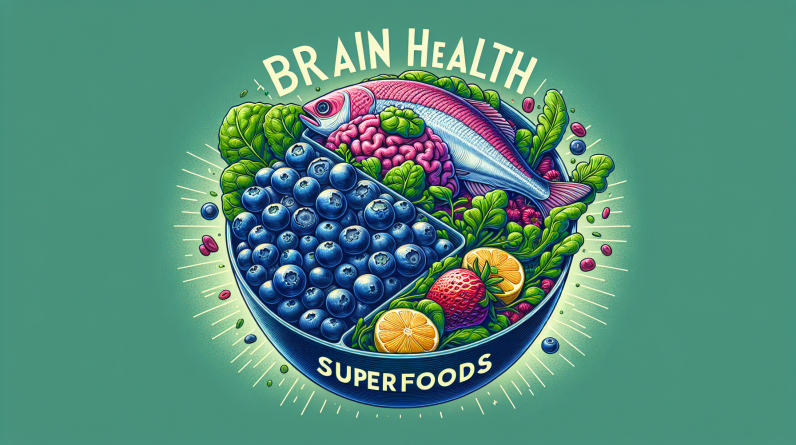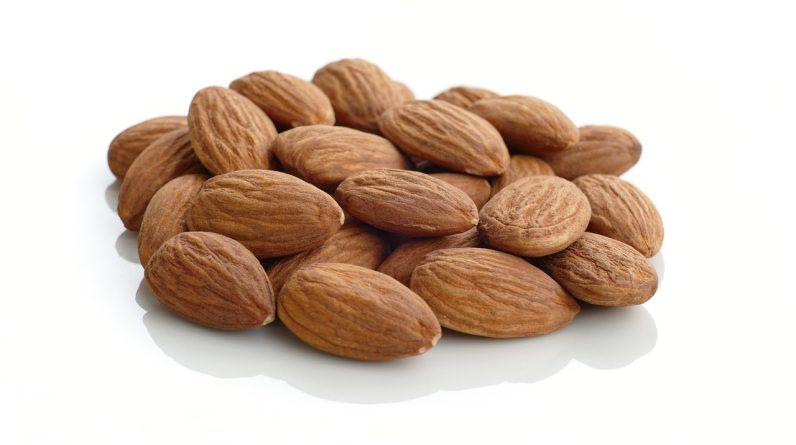
Are you looking to boost your brainpower and enhance your cognitive abilities? Look no further than the world of superfoods. These nutritional powerhouses are not only delicious but also packed with nutrients that can support brain health and function. From blueberries and avocados to salmon and nuts, incorporating these superfoods into your diet can provide you with the mental edge you need for sharper focus, improved memory, and increased mental clarity. So why not give your brain a nutritional boost and unlock your full mental potential?
Blueberries
Blueberries are a delicious and nutritious superfood that can greatly benefit your brain health. One of the key reasons why blueberries are considered a brain-boosting food is because they are rich in antioxidants. Antioxidants play a crucial role in protecting your brain cells from damage caused by free radicals. By consuming blueberries regularly, you can help reduce the risk of age-related cognitive decline and improve the overall health of your brain.
Additionally, blueberries have anti-inflammatory properties, which can further benefit your brain. Chronic inflammation in the brain has been linked to various neurological disorders, including Alzheimer’s disease and Parkinson’s disease. By incorporating blueberries into your diet, you can help reduce inflammation and potentially lower the risk of developing these conditions.
Furthermore, blueberries have been found to improve memory and cognitive function. Studies have shown that the antioxidants present in blueberries can enhance communication between brain cells and improve signaling in the brain. This can result in better memory retention, increased focus, and improved overall cognitive abilities.
To reap the brain-boosting benefits of blueberries, consider adding them to your morning smoothies, oatmeal, or yogurt. You can also enjoy them as a snack or incorporate them into various baked goods for a healthy twist.
Leafy Greens

Leafy greens such as spinach, kale, and broccoli are not only nutritious but also excellent for your brain health. They are packed with essential nutrients and vitamins that can help nourish your brain and support its proper functioning.
Rich in nutrients and vitamins, leafy greens provide your brain with the necessary building blocks to function optimally. They are particularly high in folate, vitamin K, and vitamin E, which have been associated with improved cognitive function and reduced risk of brain decline. These vitamins and nutrients are believed to protect against age-related cognitive decline and promote brain health.
Moreover, leafy greens have been found to reduce the risk of dementia. Dementia is a collective term for brain disorders that affect memory, thinking, behavior, and the ability to perform daily activities. Consuming leafy greens regularly may help slow down the progression of cognitive decline and reduce the risk of developing dementia.
To incorporate leafy greens into your diet, consider adding them to salads, stir-fries, or smoothies. You can also sauté them as a side dish or blend them into soups for a nutrient-packed meal.
Fatty Fish
Fatty fish such as salmon, mackerel, and sardines are not only delicious but also incredibly beneficial for your brain’s health. These fish are an excellent source of omega-3 fatty acids, which are considered essential for brain function and overall mental well-being.
Omega-3 fatty acids are crucial for brain health as they make up a significant portion of the brain’s cell membranes. They also have anti-inflammatory properties and help build new brain cells, promoting optimal brain function.
Consuming fatty fish regularly has been shown to boost brain function. Studies have found that the omega-3 fatty acids in fish can improve memory, enhance learning capabilities, and increase overall cognitive performance. These fatty acids can also reduce the risk of age-related cognitive decline and potentially lower the risk of developing Alzheimer’s disease.
To incorporate more fatty fish into your diet, consider grilling or baking them for a healthy and delicious main course. You can also try adding them to salads or enjoy them as a filling and brain-healthy sandwich.
Turmeric
Turmeric is a spice that has gained immense popularity for its numerous health benefits, including its positive impact on brain health. The active compound in turmeric, known as curcumin, is a potent antioxidant that has been extensively studied for its neuroprotective properties.
Curcumin has been found to improve memory and attention span. It is believed to enhance a specific growth hormone in the brain that helps form new connections between brain cells, leading to improved cognitive function. Additionally, curcumin has anti-inflammatory effects, which can help reduce the risk of brain disorders and protect against age-related cognitive decline.
To incorporate turmeric into your diet, you can add it to various dishes such as curries, rice, or roasted vegetables. You can also enjoy turmeric tea or incorporate it into your daily smoothies for a brain-boosting twist.
Dark Chocolate
If you’re a chocolate lover, you’ll be delighted to know that dark chocolate can also benefit your brain health. Dark chocolate, particularly the one with a high percentage of cocoa, is rich in antioxidants known as flavonoids.
The antioxidants present in dark chocolate can enhance focus and concentration. They work by increasing blood flow to the brain, which may result in improved cognitive function and increased mental alertness. Additionally, the flavonoids in dark chocolate have been found to have mood-boosting properties, potentially reducing stress and promoting overall well-being.
However, it’s important to consume dark chocolate in moderation, as it is still high in calories and fat. Aim for a small portion of dark chocolate as a treat or incorporate it into healthy recipes such as energy balls or smoothies for a guilt-free brain-boosting dessert.
Pumpkin Seeds
Pumpkin seeds are not only a popular snack but also a nutritional powerhouse when it comes to brain health. They are packed with antioxidants such as vitamin E and magnesium, which play a vital role in supporting brain function.
The antioxidants present in pumpkin seeds can help reduce inflammation and protect your brain cells from damage caused by free radicals. Additionally, the magnesium in pumpkin seeds has been associated with improved memory and cognitive function. It is believed to enhance communication between brain cells and promote optimal brain health.
Furthermore, pumpkin seeds are known to enhance mood and sleep. They contain an amino acid called tryptophan, which is involved in the production of serotonin, a neurotransmitter that regulates mood and promotes relaxation. Consuming pumpkin seeds can potentially help improve sleep quality and alleviate symptoms of anxiety or depression.
To enjoy the brain-boosting benefits of pumpkin seeds, you can eat them as a snack on their own or sprinkle them over salads, yogurt, or oatmeal for an added crunch and nutritional boost.
Broccoli
While many people may not consider broccoli as a brain-boosting food, it is undoubtedly an excellent choice for supporting brain development and reducing the risk of mental decline. Broccoli is packed with antioxidants, vitamins, and minerals that can nourish your brain and promote optimal brain function.
Broccoli is particularly rich in antioxidants such as vitamin C and vitamin K, which help protect your brain cells from oxidative stress and damage. These antioxidants also support the production of neurotransmitters, which are essential for proper brain function.
Furthermore, broccoli contains compounds known as glucosinolates, which the body converts into various bioactive compounds. These compounds have been found to have anti-inflammatory and neuroprotective effects, reducing the risk of brain disorders and age-related cognitive decline.
To incorporate more broccoli into your diet, you can steam or roast it as a side dish, add it to stir-fries, or blend it into soups for a nutrient-packed meal.
Walnuts
Walnuts are not only a delicious snack but also a powerhouse when it comes to brain health. They are high in antioxidants and omega-3 fatty acids, making them an excellent choice for boosting cognitive function and enhancing memory.
The antioxidants present in walnuts can help reduce inflammation and oxidative stress in the brain. This, in turn, may protect against neurodegenerative diseases and age-related cognitive decline. Additionally, walnuts are rich in alpha-linolenic acid (ALA), an omega-3 fatty acid that is essential for brain health and function.
Consuming walnuts regularly has been shown to improve cognitive function. Studies have found that walnuts can enhance memory, improve processing speed, and increase overall brain performance. They are also believed to have protective effects against age-related cognitive decline.
To enjoy the brain-boosting benefits of walnuts, you can eat them as a snack on their own or incorporate them into various recipes such as salads, oatmeal, or baked goods.
Oranges
Oranges are not only a refreshing and tasty fruit but also an excellent source of vitamin C, which plays a crucial role in brain health. Vitamin C is a powerful antioxidant that helps reduce oxidative stress in the brain and protect against age-related cognitive decline.
Consuming oranges or drinking orange juice can boost mental alertness and concentration. Vitamin C is involved in the production of neurotransmitters such as dopamine and norepinephrine, which play a significant role in attention and focus. By incorporating oranges into your diet, you can potentially enhance your cognitive abilities and improve your overall brain health.
Furthermore, vitamin C has been found to have neuroprotective effects and may help reduce the risk of brain disorders. It can support the health and integrity of brain cells, potentially preventing damage and promoting optimal brain function.
To enjoy the brain-boosting benefits of oranges, you can eat them as a snack, squeeze fresh orange juice, or incorporate them into smoothies for a refreshing and nutritious treat.
Green Tea
Green tea has been enjoyed for centuries not only for its taste but also for its numerous health benefits, including its positive impact on brain function. It contains caffeine and an amino acid called L-theanine, which work together to provide unique and beneficial effects on the brain.
The caffeine present in green tea can help improve brain function and focus. It stimulates the central nervous system and enhances the release of neurotransmitters, leading to increased alertness, improved reaction time, and enhanced cognitive performance.
Additionally, L-theanine in green tea promotes relaxation and calmness. It can counteract the anxiety-inducing effects of caffeine and promote a state of relaxation and mental clarity. The combination of caffeine and L-theanine in green tea provides a more balanced and sustained form of energy and focus without the crash often associated with other caffeinated beverages.
Drinking green tea regularly has also been associated with increased brain connectivity and a reduced risk of cognitive decline. The antioxidants present in green tea can help protect against age-related brain disorders, potentially improving overall brain health.
To incorporate green tea into your routine, consider replacing your usual caffeinated beverages with a cup of green tea. You can enjoy it hot or cold, enhance its flavor with a squeeze of lemon or a hint of honey, and reap the brain-boosting benefits it offers.
Incorporating these superfoods into your diet can greatly benefit your brain health and overall well-being. They provide essential nutrients, vitamins, and antioxidants that nourish your brain, reduce inflammation, and enhance cognitive function. By making these brain-healthy foods a regular part of your meals and snacks, you can optimize your brain health and support long-term cognitive function. So, why not start incorporating these superfoods into your diet today and give your brain the boost it deserves!






